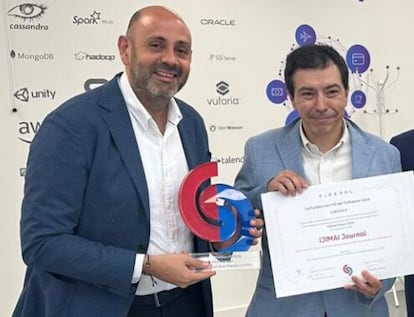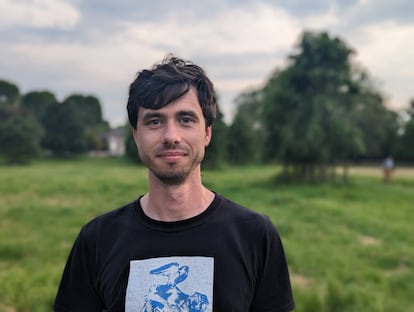Spanish university administrator and colleagues linked to ‘factory’ producing fraudulent scientific studies
The engineer Rubén González Crespo, one of the most cited researchers in the world, and other academics in Spain claim to be victims of a sketchy Indian professor. Together they have 16 retracted papers

An anonymous person sent an alarming email to dozens of scientific journal editors around the world on April 12, 2022. A Spanish editor received it at 4:40 a.m. The opening line read: “Dear professors, good morning. This is an important message for you.” The whistleblower went on to allege that an Indian scientist named Gunasekaran Manogaran had established a large-scale system of churning out fraudulent scientific studies. The scheme allegedly involved selling authorship of fake studies to researchers, especially from Asia, who were keen to rapidly publish for career advancement. Managoran then successfully submitted these fake studies to reputable scientific publishers such as Elsevier, Springer Nature, Wiley and MDPI.
Computer scientist Rubén González Crespo, the vice-chancellor of Spain’s International University of La Rioja (UNIR), has already had four of his studies linked to this plot retracted, including one on fertilizer use in vineyards co-authored by six Chinese people he’s never heard of. González claims not to know how his name ended up on those papers. He and three closest colleagues have had at least 16 studies that bear their names retracted. A second anonymous email begged the editors: “Please, do justice.”
González and his three colleagues say they are victims of a scam. González says that Manogaran contacted him in early 2020 regarding the artificial intelligence journal he cofounded and now edits — International Journal of Interactive Multimedia and Artificial Intelligence (IJIMAI). Manogaran introduced himself as a prominent researcher at the University of California, Davis, and the two academics decided to collaborate on various initiatives. Manogaran was even appointed associate editor of IJIMAI, which is published by UNIR, a private online educational institution founded in 2008 by Miguel Arrufat, one of the 50 richest people in Spain according to Forbes magazine. UNIR has an enrollment of over 50,000 students in Spain and Latin America.
The anonymous emailer, who claimed to be a former employee of Manogaran, explained how the plot works. Scientific publishers have adopted a new business model in recent years. Instead of charging readers, authors now pay to have their studies published in open access journals; the fees typically range from $2,000-$6,000. This creates a problematic incentive. Some magazines have started publishing special issues more frequently, even multiple times a day, to maximize profits. The International Journal of Environmental Research and Public Health (MDPI) published 17,000 studies last year, 13 times more than the previous year, making it the most popular publishing outlet for Spanish scientists in the last five years. According to Italian economist Paolo Crosetto, this journal has already published over 3,000 special issues in 2023, over eight per day. A decade ago, the MDPI publishing company established by Chinese chemist Shu-Kun Lin used to publish fewer than 400 special issues annually. However, this year, they are expected to publish 56,000.
Gunasekaran Manogaran proposed special issues to hundreds of journals from major publishers. The whistleblower estimates that around 5% of the journals accepted these proposals. Once in control of these specials, Manogaran’s team included fraudulent or irrelevant studies that cited previous papers on the same topic. In the field of science, authoring a study with a high number of citations is considered an indicator of quality. Unfortunately, this system is tainted by deceitful practices, such as citing your own papers to artificially boost visibility, a favorite tactic of the Manogaran network.
González and his colleagues participated in several of these tainted special issues as guest editors or co-authors of specific papers. “The publishers that retracted my articles [Springer Nature has retracted three and Elsevier one] did not do so because of problems with the scientific content, but because of Manogaran’s practices, of which we are victims. We had absolutely no idea what this man was doing,” said González.
Gunasekaran Manogaran, a data scientist at the Vellore Institute of Technology in India, is hard to pin down. In the photo he typically sends for scientific conferences, the goateed man is sporting a vest and purple tie. However, it seems like no one has ever seen the man in person. Calls to his mobile phone in India get abruptly disconnected with a recorded message: “The number you are trying to reach is not available.” He also did not reply to any of the messages we sent to three of the email addresses he uses regularly. A spokesperson for the University of California, Davis confirmed that Manogaran worked there as a postdoctoral researcher for a couple of years until June 2020. He also presents himself as a visiting researcher at UNIR, but González says he was only offered an online conference that never happened.

According to documentation provided by British engineer Nick Wise, who investigates scientific fraud in his spare time, the first anonymous email accused eight scientists of participating in Manogaran’s scam. Among them were Óscar Sanjuán and Vicente García Díaz from Spain, as well as Carlos Enrique Montenegro from Colombia. These three men regularly collaborate with Rubén González Crespo and have held various positions with the UNIR journal. All four flatly deny having voluntarily participated in Manogaran’s scheme.
EL PAÍS interviewed Vicente García Díaz, a computer engineering professor at the University of Oviedo (Spain) on September 4. García admitted signing studies with unknown Asian co-authors without contributing to them. “A friend of mine from another university mentioned that Gunasekaran, a colleague of his, was seeking more collaborators. He explained that they need people from the West to co-sign the studies, as journals tend to reject articles if all the co-authors are from countries like India, Pakistan, and Iran. I thought it wouldn’t hurt to help him out,” said García, who denies having received payment for the favor. Five of his studies have been retracted, one of which examined industrial operations scheduling and involved a co-author from Papua New Guinea. Another study involved a co-author from the Vellore Institute of Technology, the same institution where Manogaran studied. The anonymous tipster claimed that Manogaran set up a factory assembly line with young researchers from Vellore to churn out scientific papers. In return, these researchers were given the opportunity to publish their work in international scientific journals.
García Díaz responded to questions from this newspaper:
EL PAÍS. “Do you know any of the co-authors of the studies that have been retracted?”
García Díaz. “I would say no, because I think these are the studies where [Manogaran] put me down as a co-author, but I don’t know them.”
EL PAÍS. “And did you read these studies before they were published? Or did they just put your name on them?”
García Díaz. “They just put my name on them. Honestly, I trusted it because I had no idea people could actually buy or invent a study. When I saw Manogaran’s impressive resume, I just naturally assumed his papers were good.”
EL PAÍS. “It’s pretty ugly to slap your name on a study where you haven’t done anything.”
García Díaz. “Yes, quite right. But, honestly, I didn’t think much of it. I know it’s kind of ugly, but the whole point was just to make it easier for the journals to consider these studies, so that all the co-authors weren’t Indians. I didn’t really put that much thought into it because I was so busy with other articles that were actually mine.”

García Díaz’s story didn’t match his three colleagues, who chose to reply to us in writing after a few days. “I would never allow my name to be added to a study in which I have not participated,” González wrote on September 20. Óscar Sanjuán, another UNIR professor, responded on September 23: “I would never agree to participate in a fraudulent study... This is a just a lot of noise and I’m a victim here.” García Díaz wrote us again on September 26, slightly changing his story and saying he had not “expressed himself correctly.” He now claims that he only participated minimally in the retracted studies, and admits that he initially lied due to embarrassment over the retractions. “My conscience is totally clear because I haven’t done anything wrong. I’m just a victim in all this,” said García Díaz.
Vice-Chancellor Rubén González Crespo is one of the most cited scientists in the world, according to a ranking by Stanford University. One reason for his apparent success is his high level of productivity. In 2021, he published a new study almost every week covering a wide range of topics, including genes linked to Alzheimer’s, traffic accident detection systems, and underwater sensor networks. González and Manogaran collaborated on three studies focusing on digital video, 6G mobile phone technologies, and artificial intelligence. A person who worked with González finds it “suspicious” that he is one of the most cited researchers globally, given his modest scientific achievements. Another ex-colleague puts it like this: “It’s like you were born in this working-class neighborhood and all of a sudden, you show up in a fancy Jaguar wearing a Rolex.”
González bluntly denies this. “I never put my name on fraudulent studies, and neither do many other scientists who have signed papers in good faith with Manogaran. It’s important to distinguish the victims from the perpetrator.” Manogaran is also one of the most cited scientists in the world, according to the rankings published by Clarivate. The list includes many mediocre researchers who have managed to exploit the loopholes in the system. According to a database created by Retraction Watch, Manogaran has seen 14 of his studies retracted, including papers on heart disease and coronavirus treatments.

Gunasekaran Manogaran is nowhere to be found, but he hasn’t stopped working. He is listed as a member of the technical committee for conferences taking place in Nanchang, China in late November. He also claims to be currently affiliated with Francisco José de Caldas District University in Bogotá, the institution where his frequent collaborator, Carlos Enrique Montenegro, earned his first degree and now teaches. Montenegro has had eight studies co-authored with Asian academics retracted. These studies examined various subjects, such as childhood depression, ecommerce platforms, and the impact of politics on emotions in the workplace. Montenegro emphatically denied that Gunasekaran Manogaran ever worked at Francisco José de Caldas District University and said, “Everything that has my name on it and the articles I’m in, it’s because I’ve put in the work and made contributions.”
Montenegro and González have collaborated on over 20 studies, including one on wireless sensor networks for smart cities led by Chinese researcher Xintian Lei, from the School of Economics at Fujian Normal University. The study was retracted by Springer Nature in December 2022. Another paper signed by Montenegro, González and Vicente García Díaz on the Internet of Things (IoT) was retracted in June 2023. In the retraction notice, the publisher stated that lead author Qin Xin did not respond to correspondence and that another co-author, Mamoun Alazab from Australia’s Charles Darwin University, said he was unaware of the submission and publication of the article. Montenegro, who earned a PhD from the University of Oviedo (Spain), is also a top executive at UNIR in Colombia. Last year, UNIR proudly announced its inclusion in the prestigious university rankings of the U.K.’s Times Higher Education. To qualify, a university must publish a minimum of 1,000 scientific studies.
Psychologist Izabela Zych, from the University of Córdoba (Spain), was the editor who received the anonymous email at 4:40 a.m. Just two months earlier, Zych had been named editor-in-chief of the Aggression and Violent Behavior journal published by Elsevier. The email said that two special issues of the journal had been manipulated by Manogaran prior to Zych’s arrival and were fraudulent. One of the guest editors — Vicente García Díaz — admitted to giving Manogaran permission to manage the special issue on his behalf.
After receiving the tip, Elsevier retracted 69 studies published in Aggression and Violent Behavior, including one on emotional intelligence in business innovation, signed by Rubén González Crespo, Óscar Sanjuán and a Chinese researcher. Sanjuán also co-authored a study on cognitive psychology applied to the training of amateur athletes, together with colleagues from China and India. The special issue, supposedly edited by García Díaz, included a Chinese study on teaching English in universities, despite the journal’s focus on aggression and violent behavior. Elsevier’s ethics committee concluded that there was significant evidence of misconduct, prompting the large number of retractions. “These study factories pose a threat to the integrity of research,” said Andrew Davis, Elsevier’s vice president of communications.

Nick Wise, an engineer from the University of Cambridge (U.K.), did not receive the anonymous email that night in April 2022, but he already knew something smelled rotten. Wise, who plays the trombone in a band called Colonel Spanky’s Love Ensemble, also spends his free time playing amateur detective to root out scientific fraud. Wise discovered several poorly conducted studies on artificial intelligence that were nevertheless referenced in hundreds of other papers. He began pulling on the thread, which led him to some peculiar studies in the Aggression and Violent Behavior journal. “You could tell just by reading the title that they were rubbish or irrelevant,” said Wise.
Wise shared his findings with EL PAÍS and an American magazine called Undark, which reported part of the Manogaran scheme in June. According to Wise, Manogoran and his team have overseen at least 67 special issues across nearly fifty journals. These issues included over 1,250 studies and involved around 70 guest editors. Wise also discovered instances of payment for co-authorships in a special issue managed by Vicente García Díaz and some Indian colleagues in the Healthcare Analytics journal published by Elsevier. “It’s a really profitable business. You can get 1,000 euros to author a study. Multiplied by 1,000 studies, that’s a million euros right there. They could have easily made several million over the years,” said Wise. “Manogaran started it all and he’s the one in charge. As for the others, I’m not sure if they get paid, but it’s clear that they’re getting a bunch of publications and citations.”
Chris Graf, Springer Nature’s research integrity director, wants to change how science is evaluated. Currently, researchers are rewarded based on the quantity of their output rather than its quality. This system, commonly referred to as “publish or perish,” needs to be reevaluated. “Publishers are up against a formidable opponent — scientific study factories. These organizations generate substantial revenue by finding ways to bypass publisher controls. We intended to allocate more resources to stay ahead in this arms race,” said Graf. Springer Nature has already retracted 15 studies by Manogaran and his Spanish collaborators. Nick Wise says that the enigmatic Indian scientist is getting ready to publish in other scientific journals, like Intelligent Data Analysis (IOS Press). “Manogaran hasn’t stopped editing special issues,” Wise warns.
Sign up for our weekly newsletter to get more English-language news coverage from EL PAÍS USA Edition
Tu suscripción se está usando en otro dispositivo
¿Quieres añadir otro usuario a tu suscripción?
Si continúas leyendo en este dispositivo, no se podrá leer en el otro.
FlechaTu suscripción se está usando en otro dispositivo y solo puedes acceder a EL PAÍS desde un dispositivo a la vez.
Si quieres compartir tu cuenta, cambia tu suscripción a la modalidad Premium, así podrás añadir otro usuario. Cada uno accederá con su propia cuenta de email, lo que os permitirá personalizar vuestra experiencia en EL PAÍS.
¿Tienes una suscripción de empresa? Accede aquí para contratar más cuentas.
En el caso de no saber quién está usando tu cuenta, te recomendamos cambiar tu contraseña aquí.
Si decides continuar compartiendo tu cuenta, este mensaje se mostrará en tu dispositivo y en el de la otra persona que está usando tu cuenta de forma indefinida, afectando a tu experiencia de lectura. Puedes consultar aquí los términos y condiciones de la suscripción digital.









































